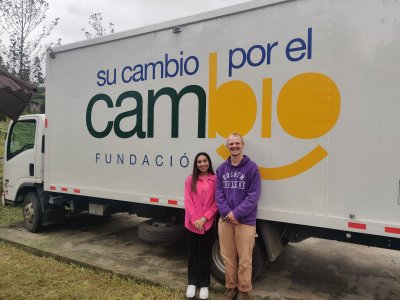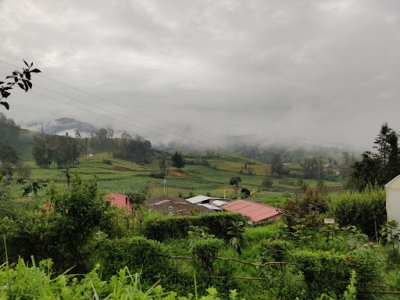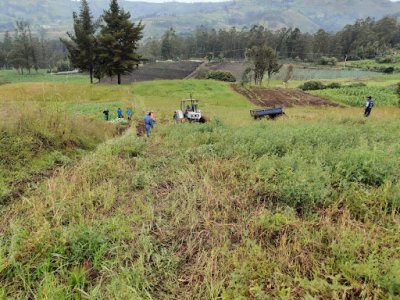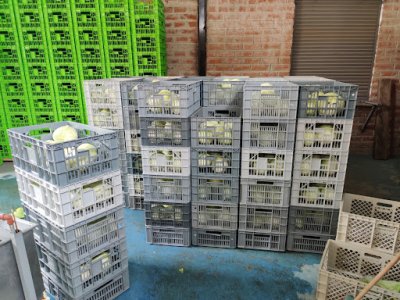Su Cambio Por El Cambio (SCXC)
During the service portion of SST, I have been volunteering at a foundation called Su Cambio Por El Cambio (SCXC) in a little town called San Simon. SCXC’s primary missions are to provide a safe after school environment for local kids and to provide services for local seniors living in poverty. The foundation also operates an integrated organic farm with four greenhouses, a dozen or so fields, cattle, pigs, sheep, chickens, rabbits, and guinea pigs. My primary work has been on the farm, and I’ve been splitting my time between working with the animals and working in the fields and greenhouses with the agronomy team.

Since I’ve been here, I’ve come to learn that Thursday mornings are the most hectic time on the farm. Every Thursday afternoon, a truck leaves the foundation full of eggs, dairy products, and vegetables on a five and a half hour drive to Quito, where SCXC sells all of its products. That means Thursday morning is typically an all-hands-on-deck rush to harvest and process whatever fruits and vegetables are being shipped to Quito in the afternoon.

Thursday, March 17th started like any other Thursday for me. My bus from Guaranda, where I’m living about thirty minutes away, arrived at about 8:00 AM and I went to the agronomy office to speak with my supervisor Rosa about what I would be doing that day. I arrived at the office and found that the building was empty. Because it was Thursday, the rest of the employees had gotten an early start on the harvest. Not knowing what to do or where to go, I looked around for about 20 minutes for anybody who could tell me where we were harvesting today, and after asking about three people who gave me inconclusive answers, I finally walked up to the top of the property for a good vantage point and spotted the tractor on a steep cabbage field across the road.

Twenty minutes later, about 45 minutes after I arrived for the day, I finally made my way over to the field and arrived to a group of people arguing and a tractor stuck two feet deep in mud halfway up the hill. When people are arguing in Spanish I have a hard time following the conversation, but I understood the general message that it had rained heavily the night before and they shouldn’t have been trying to use the tractor at all. The alternative to the tractor—carrying 1,000 kilograms of cabbage up a hill at 9,000 feet above sea level by hand—was unappealing enough that they had decided to try the tractor anyway, a decision I probably would have also made. I was lucky enough to arrive just in time to help carry the cabbages up the hill.

Rosa called in a favor and got a friend with a truck over to load the cabbages into, and I was (un)lucky enough to get the job of loading the cabbages instead of carrying them up; I avoided carrying sixty pound sacks of cabbages up a hill, but my back was screaming by the time we finished. Thankfully, we took what we had already harvested, about 600 kilograms of cabbages, and Rosa made the call to harvest the rest from a different field closer to the foundation.
After a short ride back to the foundation and 400 more kilograms of cabbages harvested, I started to help with the processing. Exhausted, I had a hard time keeping up with the conversation and just focused on the massive pile of cabbages next to me. Right before lunch at 12:30, we finally finished processing and washing all of the cabbage and loading them into crates for shipping.

The Su Cambio Por El Cambio farm is restricted by financial and environmental restraints which create inefficiencies in every area. Nonetheless, I’ve found it incredibly fulfilling to work with my coworkers here to try and overcome those obstacles, even if it means more effort and time on our part, because I’m doing it for a foundation that is a cornerstone of the San Simon community and is doing the important work of growing healthy, organic food.
-Andrew




